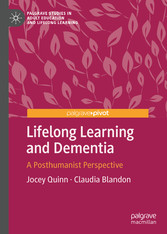
Lifelong Learning and Dementia - A Posthumanist Perspective
von: Jocey Quinn, Claudia Blandon
Palgrave Pivot, 2020
ISBN: 9783030422318
Sprache: Englisch
104 Seiten, Download: 1179 KB
Format: PDF, auch als Online-Lesen
| Acknowledgements | 7 | ||
| Contents | 9 | ||
| Chapter 1: Introduction to Dementia and Lifelong Learning | 10 | ||
| Challenging the Loss Narrative of Dementia | 10 | ||
| The Significance of a Posthumanist Perspective | 11 | ||
| Dementia: ‘Scourge’, ‘Plague’ and Punishment | 12 | ||
| Dementia as a Global Issue and Cultural Phenomenon | 14 | ||
| Dementia Care and Suffering | 15 | ||
| Arts and Dementia | 16 | ||
| Lifelong Learning and Dementia | 17 | ||
| Dementia as a Posthuman Way of Being | 20 | ||
| Dementia as a Feminist Issue | 21 | ||
| Our Research Studies | 22 | ||
| Conclusion | 28 | ||
| References | 28 | ||
| Chapter 2: A Posthumanist Perspective on Dementia | 32 | ||
| Introduction | 32 | ||
| Living in a Posthuman/Humanist Epoch | 33 | ||
| Challenging the ‘Human’ | 34 | ||
| Posthuman Theories | 35 | ||
| Thing Power and Vibrant Matter | 35 | ||
| Intra-activity and Agentic Assemblages: Sparks of Life | 37 | ||
| Silence and Bodies: ‘How Her Eyes Change’ | 39 | ||
| Affinity, Trans-corporeality and Submersion: Visiting ‘the Bottom of the Ocean’ | 41 | ||
| Potentia: Countering the ‘Semi-depressing Environment’ | 42 | ||
| Posthuman Methodologies: ‘This Has Her Attention’ | 42 | ||
| Posthuman Ethics: A Posthuman Ethics of Rights for Dementia | 45 | ||
| Posthuman Possibilities and Problems | 46 | ||
| Conclusion | 47 | ||
| References | 48 | ||
| Chapter 3: Dementia and the Post-verbal | 51 | ||
| Introduction: Beyond Words | 51 | ||
| Voice and Lifelong Learning | 53 | ||
| Our Participants | 55 | ||
| New Learning Worlds: ‘Living in a Different World’ | 56 | ||
| Unending Lifelong Learning: ‘How Wonderful!’ | 57 | ||
| Teaching Through Dementia: ‘I Don’t Know What It Is, But It Is Something’ | 62 | ||
| Understanding Time and Meaning Differently: ‘Stimulating the Bubble’ | 63 | ||
| Conclusion | 65 | ||
| References | 66 | ||
| Chapter 4: Intergenerational Learning and Dementia | 68 | ||
| Introduction | 69 | ||
| Intergenerational Approaches to Dementia | 70 | ||
| What Do You Do When You Cannot Trust Your Mind Anymore? Become a Spider | 72 | ||
| Making Bridges with Music | 73 | ||
| The Posthumanist Observation Framework: What Does a Smile ‘Do’?, Not What Does a Smile ‘Mean’? | 73 | ||
| Posthumanist Observation Framework (Quinn and Blandon 2017) | 74 | ||
| Discussion: Can You Remember the Future? | 76 | ||
| Learning About, from and with Greg: ‘There Is Something He Forgot to Forget’ (Braidotti) | 76 | ||
| Learning from and with Bernard: Intra-actions and the Value of Fluidity | 78 | ||
| Learning with and from Sarah: ‘That Bit Is the Words’: Learning Beyond Memory and Identity | 82 | ||
| Conclusion | 85 | ||
| References | 86 | ||
| Chapter 5: Conclusion | 89 | ||
| Introduction: ‘Living Inside Ideas’ About Dementia | 89 | ||
| The Trap of Memory: ‘I Always Remember Us’ | 91 | ||
| Learning in and Through Dementia: ‘Discovering the Treasures’ | 92 | ||
| The Value of Moments: ‘It’s Wonderful’ | 93 | ||
| Dementia Research: ‘No One Can Be in Their Head’ | 95 | ||
| Dementia: Not a Wasteland for Learning | 96 | ||
| Conclusion: Dementia and a Sustainable Planet | 97 | ||
| References | 97 | ||
| Index | 99 |








